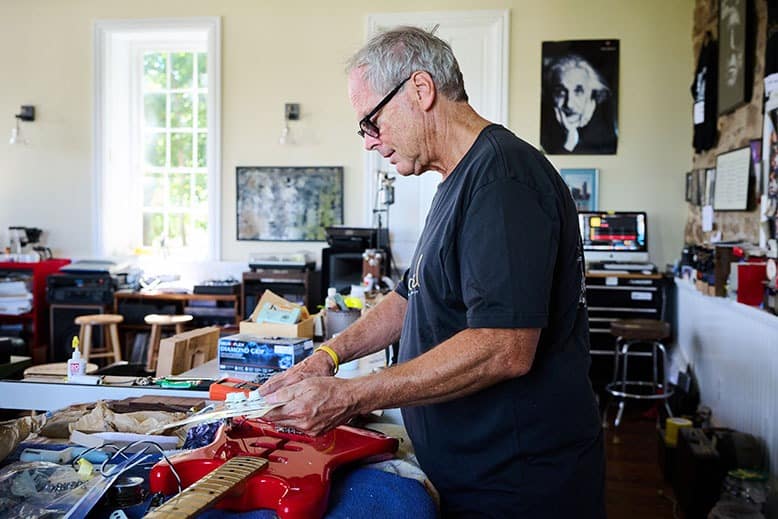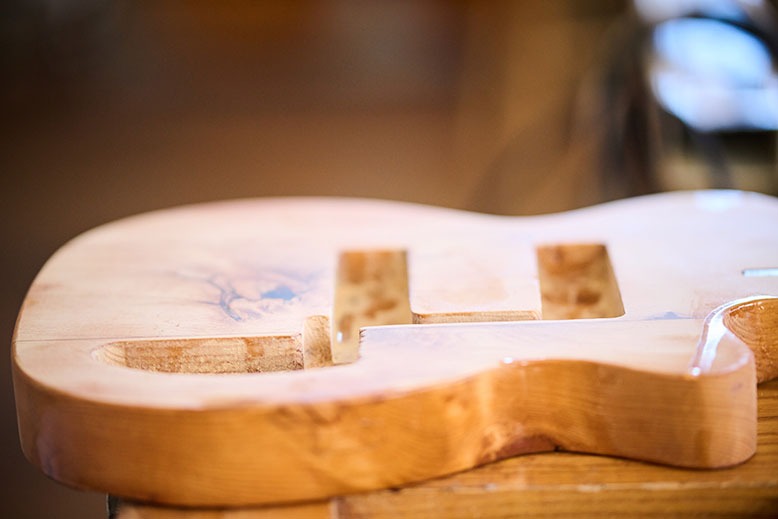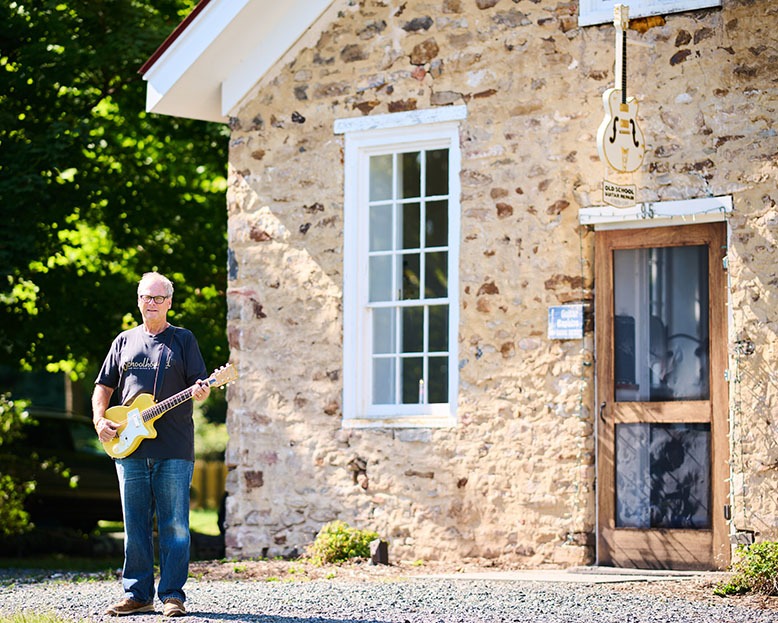When it comes to specialized guitar repairs, Curt Wilson is considered a world-class craftsman in a field that’s becoming a lost art. He’s so highly regarded for his expertise that many well-known musicians travel for his services.
As a sought-after luthier (a maker of stringed instruments, such as violins or guitars), Wilson is considered a trusted afficionado to avid guitar players looking for custom enhancements for their instruments. When news of his extraordinarily finely tuned talents began reaching the communities of musicians in New York, Philadelphia and beyond, a steady stream began bringing their cherished instruments to him for refurbishment.
A few of his loyal, longtime customers include Tommy Stinson, former bassist for the Replacements and Guns N’ Roses; Jody Porter, former lead guitarist in New Jersey’s Fountains of Wayne power-pop band; Philly favorite Kurt Vile; and guitarist Steve Hunter, who played with Lou Reed and Alice Cooper, among others.
Wilson’s skill and artistry enables him to address all guitar-related needs, including re-fretting necks, all things electric, major structural fixes, and building instruments from scratch. Audubon musician John Magill, of the band John Magill and the Have Nots, has known Wilson for nearly 17 years and is a repeat customer for his guitar-repair service. “I call Curt a disturbed perfectionist because he always needs to get everything exactly right. I think it’s how he approaches his work, because the instrument needs to be perfect before he lets them go. That’s what puts him way above anyone else I’ve ever used for repairs,” Magill says.

Audubon musician John Magill calls Wilson “a disturbed perfectionist.” Photo by Jennifer Pottheiser
“My main guitar is a vintage 1960 Gibson J-50 acoustic that became unplayable and considered unfixable. So, I started collecting signatures on it for years…including Patti Smith, Keith Richards, Chrissie Hynde, and dozens of other Hall-of-Famers. Eventually, I asked Curt to try and fix it. He worked his magic and repaired it beautifully—and that’s the guitar I play onstage today.”
Wilson custom builds premium guitars from the reclaimed roof of the original schoolhouse, where his workshop is now located. His creations are called SchoolHoused guitars, and the distinctive sound of his work is arguably the essence of centuries-old history.
Wilson crafts every guitar by hand and so far he’s made 25 of these one-of-a-kind instruments. Through word-of-mouth, his orders have skyrocketed and he now has a waiting list of about 30 people. (Prices start at $2,000). Wilson takes incredible pride in these instruments and says, “It’s always a thrill to see a guitar that I built appear on the stage, or in a video.”

Wilson has so far fashioned 25 guitars from scratch. Photo by Jennifer Pottheiser
Jody Porter owns two custom “Beach Blaster” Telecaster-style electric guitars that Wilson tailored to Porter’s personal specifications and made from the original schoolhouse’s roof. Played on stage many times, these guitars appear on multiple songs on his latest album, Waterways (2020).
“Both guitars turned out exceptionally well. Curt even left a hole in the wood from an original nail, that I call chronological coolness,” he says. “Curt is really, really good at his craft, and a good human being, too.”
Born in 1958, Wilson was a rock and roll fan from a young age. His love of guitars began around the eighth grade, when his parents gave him an inexpensive Conn Acoustic. Later, he played a Teisco “Del Rey” electric six-string from Sears.
The quality, and the quantity, of his guitars have increased over the years. Although he works on a variety of name brands, he’s partial to the Gretsch company. His vintage 1958 Gretsch Cadillac Green “Country Club” model is his beloved possession, purchased in the 1970s for a mere $300. Today, it’s valued at more than ten times that.
***
Wilson’s journey to open his business can be described as a series of serendipitous events. He did not initially intend to embark on restoration, or to move his business into an historic structure. After 30 years of running an auto-supply company, he spends time doing what he loved best—fixing and building instruments at home, where he lives with his wife, Carmen, a teacher in Hopewell.
When his workshop began bursting at the seams, Wilson started looking for a new location for his one-man shop. Without a plan or destination in mind, Wilson drove through Mercer County and randomly discovered the crumbling, historic schoolhouse on Pennington-Hopewell Road in Hopewell, which was up for auction within a week.
Today, Wilson is the proud owner of Old School Guitar–Repair, Restoration and Lutherie, located in a historic schoolhouse built in 1825, that he renovated himself. The one-room structure was originally known as Marshall’s Corner Schoolhouse and was transformed into a music workshop, where Wilson now builds and overhauls an array of stringed instruments.
His vision for Old School Guitar required about 18 months of renovation, officially opening in 2013. Wilson loves running his thriving solo business. He says his philosophy is simple. “I’ve never been a planner and never known what I wanted to do when I grew up. I just go with whatever happens. For me, I kept my goals low, and everything turned out great.”

Wilson ran an auto-supply company for 30 years before opening Old School Guitar. “At the schoolhouse, I’m happy every day of the week,” he says. Photo by Jennifer Pottheiser
Refurbishments to the building were extensive and included a new geo-thermal heating and air-conditioning system. The original roof, built from Douglas fir, was replaced; once-hidden cornerstones were exposed, and a new loft was added. The transformed, natural light–filled structure has soaring 25-foot ceilings, with exposed beams that rise above the new loft that’s filled with playful music memorabilia, including classic amplifiers, a pedal-steel guitar and more. Combined, these elements result in the interior’s warm, acoustic sound.
“The schoolhouse’s original 18-inch-thick greystone walls are independent from the floors, which means there’s no echo, and that’s ideal for a recording studio environment,” he says.
Wilson estimates the building’s time-worn wooden planks are over 250 years old. When he first inspected their condition and counted the rings, he was delighted to find that this dry wood with a tight grain was prime for upcycling.
***
According to local history, the quaint, one-room schoolhouse was used for educating children until 1930, when it became the local Lion’s Club headquarters. It was also rumored to have been used as a community gathering spot during the famous Lindbergh baby-kidnapping case in the 1930s, as it was one of the few area places with a television. Later, in the 1970s, it was home to the Stonybrook Millstone Watershed Association. After that, it remained vacant and fell into disrepair.
Wilson says the building was nearly forgotten for decades. “For years it sat there. The weeds had grown so tall around the school that it was completely hidden from sight. Anyone driving by on the road would never know there was a building there.”
Discovering some interesting artifacts, including antique inkwells and remnants of train tracks, was an unexpected part of the process. The classroom’s slate blackboard, uncovered during the renovation, is now incorporated into the design.
“At the schoolhouse, I’m happy every day of the week, and it’s always fun to come to work,” Wilson says. “There’s never been a bad day here, and I absolutely love my job.”
Marla Cimini is a longtime contributor to New Jersey Monthly.
No one knows New Jersey like we do. Sign up for one of our free newsletters here. Want a print magazine mailed to you? Purchase an issue from our online store.
The post Jersey Guitar Craftsman Is Leading Expert in a Lost Art appeared first on New Jersey Monthly.
